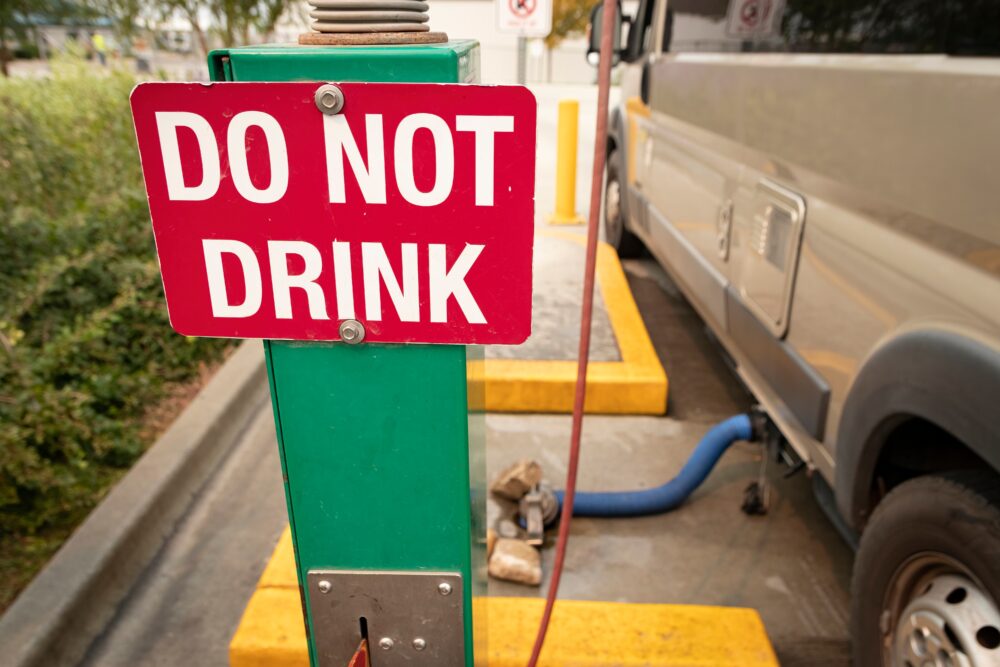How To Get Rid Of RV Gray Water Tank Odors
One of the greatest parts of modern RV life is the ability to carry fresh water everywhere you go. You can cook, clean, shower, and run all sorts of appliances with this water.
Unfortunately, it has to go somewhere once it’s dirty. Everything that’s not sewage ends up in the RV gray water tank. Sometimes these get pretty smelly, and this is a problem every RVer needs to be prepared for.
Black water tanks need to be regularly emptied and cleaned, but gray tanks are sometimes an afterthought. You shouldn’t ignore this dirty water though! The combination of dirt, soap, food particles, hair, and grease can create a nasty stew inside your holding tanks. It shouldn’t be surprising that gray water gets stinky after it sits for awhile.
There are several factors that can create odors in your RV. Even if you clean the tank out, the problem may linger. We’ve compiled some possible problems below so you can troubleshoot the issues with your gray water tank. With a bit of investigation and elbow grease, you can enjoy a clean, fresh-smelling RV once again!
Potential Gray Water Problems
Gray water doesn’t usually smell great, but most of the time, your plumbing system will keep things sealed off so you’ll never notice. If you consistently notice bad odors coming from the water tank, there may be problems with different parts of your system. If something breaks or malfunctions, it can lead to leaks that disperse the smell throughout your RV.
We’ll explore each of the potential culprits below, so be sure to check each area. That way, you’ll know where the problem is and how to fix it.
Faulty air admittance valve
Air admittance valves are installed in all RVs and appear in other plumbing systems as well. These are supposed to be one-way valves that allow air to enter into the pipes and improve water flow. When they’re working correctly, they keep the P-trap operational and allow water to pass through the pipes without issue.
If you have a faulty air admittance valve, it can siphon water through the P-trap, which allows gray water to back up a bit. A bad valve also releases odors that would normally be sealed off. If you suspect that this is the problem, you may need to replace the entire valve. It’s a fairly simple fix, but it’s easy to overlook!
Blocked plumbing vents
Good ventilation is the key to a fresh-smelling RV! If you have proper airflow, you’ll be able to avoid all sorts of problems, including odors from the RV gray water tank. Most RVs have at least one plumbing vent, but some have multiple. These allow odors to escape rather than build up within the vehicle.
There can be problems if your vents are blocked or underperforming. If you smell something bad coming from your RV gray water tank, try clearing the vents. You can also install siphons that draw foul air up and out, rather than letting it stew.
Cracked pipe or hose
Sometimes there’s an issue within the plumbing system itself. Cracked pipes and hoses can be a huge problem for RVers, so you should always be on the lookout for early signs of water damage.
Listen for any strange dripping or hissing noises when you run the water. Bad smells are another warning sign that something has gone wrong.
Check your pipes and connection hoses if you’re worried. Sometimes the damage might not be obvious, especially if the hose is bent at an angle that mostly covers up the crack. Replace various pieces if they’re broken or leaking.
Buildup in drains
Sometimes the issue is in the pipes rather than the RV gray water tank. We flush a lot of stuff down our drains and sometimes it leaves a residue. If this buildup lingers in the pipes, it can start to smell pretty bad, especially if there are rotting food particles or mold in the mix.
In this case, you’ll need to apply a drain cleaner. There are chemical options, as well as DIY methods. Baking soda is one of the best bases for sinks, and you can combine it with other ingredients such as vinegar, lemon juice, salt, cream of tartar, or just hot water! You’ll need to let your chosen mixture sit for about one hour before flushing it all down with some clean, hot water.
If you want to use a commercial cleaning product, try things like:
Use a holding tank treatment to reduce odors
Once you’ve dealt with the source of the leak, you can turn your attention to the RV gray water tank. As mentioned earlier, gray water doesn’t always smell great. Even though it’s mostly water and soap, there are other particles that can stink if they’re left for too long.
If you want to cut off the smell at the source, add a holding tank treatment to your RV gray water tank. Some good commercial options include:
- Valterra Odorlos V77012 Holding Tank Treatment
- HAPPY CAMPERS RV Holding Tank Treatment
- Camco TST Lemon Scent Odor Control
You can also make a DIY solution with a mixture of water, borax, citric acid, and baking soda.
Gray Water Maintenance Tips
Getting rid of the smell is all well and good, but there are some preventative measures you can take that will ensure that your gray water stays as fresh as possible. If you want to minimize the amount of residue in your tank, try to cut back on the odor production and attack the source of the issue.
Below are some tips that will help you properly maintain your RV gray water and reduce the risk of bad smells appearing.
Regularly dump, clean, and sanitize the tanks
The first step is performing regular maintenance on your holding tanks. This is especially important for the black water because you don’t want to deal with sewage issues. But the gray water is important to empty and flush out too. Dump the gray water as soon as it fills up, and don’t let it sit for extended periods of time.

Don’t use the food disposal
Food particles are one of the biggest culprits when it comes to smelly RV gray water. If you flush food down your sink, it can rot and contaminate the entire tank.
Even if you have a food disposal unit in your RV, it’s better to put food scraps in the garbage instead of the sink. NEVER pour grease down the sink either! This can clog up your pipes, plus it smells terrible once it goes rancid.
Install sink traps and drain covers
Along those same lines, try to trap as much debris as possible before it goes down the drain. Hair, dead skin, soap chunks, sand, and other particles can build up in your drains and create troublesome clogs.
Invest in a few mesh drain covers so you can capture debris before it enters the gray water tank. This will reduce odors, plus it helps the plumbing operate more smoothly.
Use an exterior hose
Lots of modern RVs have an exterior hose attachment. This comes in handy for a variety of reasons, but you can use it to take care of dirty work so your gray water tank doesn’t have to.
For instance, use an exterior hose to wash off your dirty feet, bathe pets, clean grills, or deal with any other thing that you don’t want to introduce into your RV gray water tank.
Air out the RV
Finally, you can improve the smell of your RV by keeping it well-ventilated. Run the plumbing vents so you can disperse bad odors and try opening windows to let in some fresh air. You can also avoid musty or stale smells if you regularly air out the RV.
Keep track of your RV maintenance
Make sure you keep track of all your RV maintenance and repairs with an online tool such as RV LIFE Maintenance. Not only can you keep all of your documents in one place, but you’ll also receive timely reminders when maintenance is due to help you avoid costly repairs and potentially serious accidents.
Related articles:



